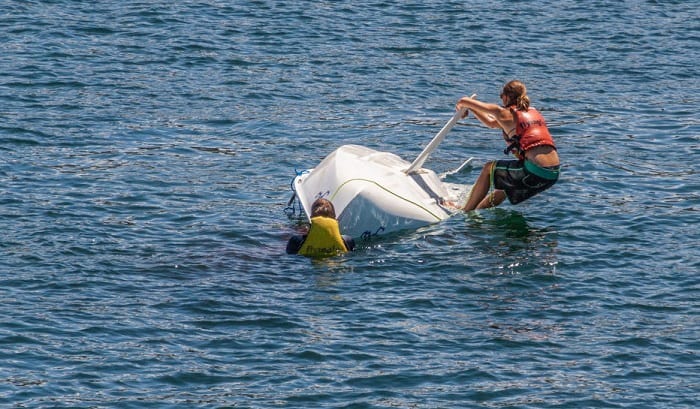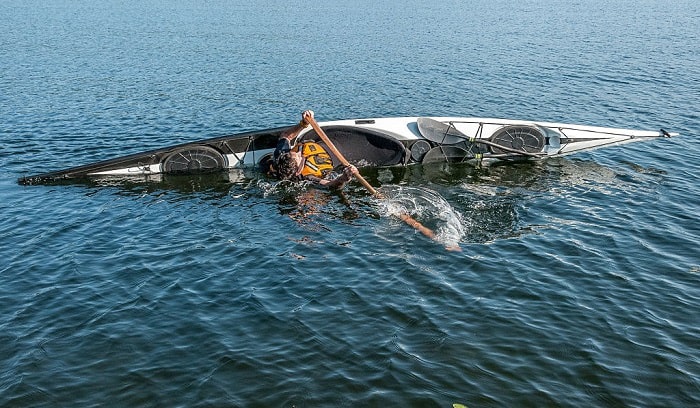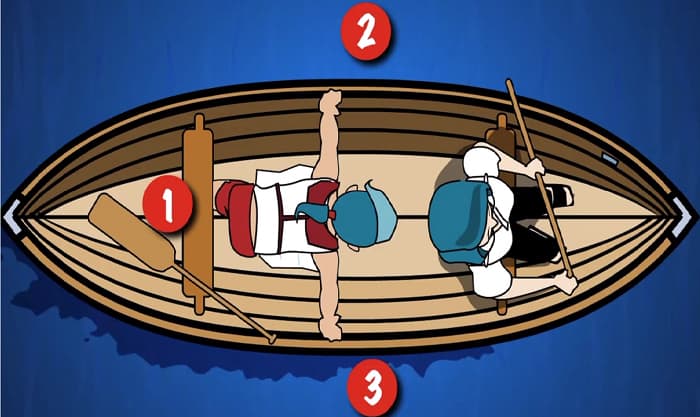The sky is clear, and the weather report is good. You are on your boat, enjoying the water. Then, all of a sudden, it is windy, and the waves are big. Your boat flips. What should you do if your boat capsizes?
When a boat capsizes, the most important thing is to fight for your survival. This is possible by staying calm and afloat. Save your energy and know-how to send distress signals to request rescue.
Keep on reading and I will share some of the best things to do if your boat turns upside down. But, more importantly, I’ll talk about how you can prevent such a frightening experience.
Table of Contents
The Main Causes of Capsizing
To start, let’s first have a rundown of the main factors that cause a boat to capsize. Once you are familiar with the reasons behind this nightmare, it is easier to survive the catastrophe.
1. Poor Weight Distribution
The most common cause of capsizing is the boat’s instability, which can be due to improper weight distribution. Especially in small and large boats, it is easy to flip when one part has more weight than the other.
Even if the total weight is within the maximum capacity, this is not a safety assurance. If most of this weight is in front of the boat and the rear is light, capsizing is possible. Staying calm will help in saving your energy.
2. Leaks
From faulty fittings to forgetting to put the drain plug on, leaking happens in a boat. Inevitably, when the water inside is more than what the boat can support, it will be unstable. In turn, it is easier for the boat to flip, especially when there are harsh waves and winds.
3. Weather
Even if there is proper weight distribution and no leaks, capsizing can happen when the weather is bad. A huge wave can overwhelm any boat. Strong winds will have the same effect. So, make sure to check the weather forecast before you start sailing.
What Should You Do
1. Remain Calm
It is natural for people to panic when a boat capsizes. After all, it is one of the leading causes of fatalities in the water. However, this won’t do you any good. So instead, I suggest that you stay as calm as possible. In turn, this will help you focus on your next steps.
When the boat is already upside-down and you are in the water, panicking will result in drowning. Therefore, stay as relaxed as possible, regardless of how difficult it is given your situation.
2. Recover the Things that You Need
Once you are in the water, grab everything you will need to survive, including flotation devices. Do not bother rescuing things that are unessential for survival. Prioritize only those that you will need to float and send a distress signal.
Stay Afloat
Your priority is survival. The latter is possible by staying afloat. When you are aboard, make it a habit to wear a life jacket, even if you are confident of your swimming skills. This is a lifesaving device that you are sure to be thankful for.
When there are still parts of the boat that you can see in the water, go near them. Then, grab the largest part that floats and hold it. This way, you don’t have to tread, and you can also conserve energy.
If you do not know how to float, watch this short video. It teaches how to achieve natural buoyancy. This knowledge will save your life when a boat capsizes.
And if you are looking for a life jacket that can help you to stay afloat? Make sure to check out Airhead Trend Life Vest.
Ask for Help
It won’t take long before exhaustion overwhelms you. Once you are calm, start seeking assistance. If your life vest has a whistle or light, use it to send a distress signal. You can also use smoke and signal flares if you have them in your grab bag.
Stay Near the Boat
Do not swim away from the boat once it capsizes, unless it is getting near a hazard. By being as close as possible to the boat, you will have something to hold on to stay afloat. Furthermore, your boat is the most visible object in the water, making it easy for you to be seen by rescuers.
Turn the Boat
If the boat is light enough for you to overturn, pay attention to righting its position. Ask for a helping hand from the other passengers. After turning the boat, you can get in it and sail away from the hazards.
How to Prevent Your Boat from Capsizing
Like with other boating accidents, prevention is better than cure. So, to minimize the chances that your boat will capsize, below are some of the best things to do:
- Inspect the boat before leaving. Make sure that there are no leaks and other problems that can cause the boat to flip over.
- Ensure proper weight distribution. From people to cargo, see to it that the front and rear parts of the vessel have equal loads.
- Passengers must sit only in the designated areas. No one should be sitting on the bow, gunwale, and motor cover.
- Be careful when turning, especially in rough waters. The faster you turn, the higher is the likelihood of capsizing.
- Secure the anchor on the boat’s bow line and never on the stern. Otherwise, the weight will concentrate on one part of the boat.
- Check the water before sailing. If the water condition is rough, do not continue.
Conclusion
A boat can capsize without warning. One minute, you are enjoying the water, then in a split second, the boat can flip over. When it happens, stay calm and prioritize survival.
Observe the proper safety precautions to prevent your boat from capsizing. This is possible by ensuring proper weight distribution, checking for leaks, and wearing safety equipment, such as the Airhead Trend Life Vest.
Did you enjoy reading this guide on what should you do if your boat capsizes? Are there other things that you would like to add? Feel free to leave a comment below.
Related: Top 3 types of boat capsizes the most

I am passionate about water sports and technical fields, so combining both makes me interested in making contents about boat accessories. With my partner, we went on many trips and sports games together, which led us to think about how we can spread our joys and passions to many people.



